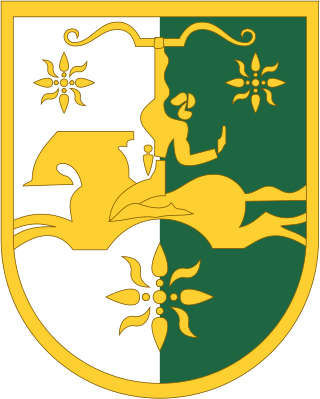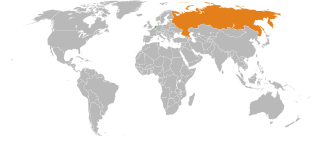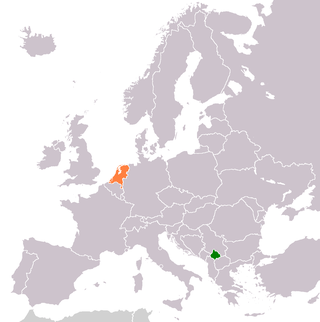
The Byelorussian SSR was one of only two Soviet republics to be separate members of the United Nations. Both republics and the Soviet Union joined the UN when the organization was founded in 1945.

The foreign policy of the Netherlands is based on four basic commitments: to the Atlantic cooperation, to European integration, to international development and to international law. While historically the Kingdom of the Netherlands was a neutral state, since 1945 it has become a member of NATO, the United Nations, the European Union and many other international organizations. The Dutch economy is very open and relies on international trade. During and after the 17th century—its Golden Age—the Dutch built up a commercial and colonial empire. It was a leading shipping and naval power and was often at war with England, its main rival. Its main colonial holding was Indonesia, which fought for and achieved independence after 1945. The historical ties inherited from its colonial past still influence the foreign relations of the Netherlands. Foreign trade policy is handled by the European Union. The Dutch have been active in international peacekeeping roles.

As part of the foreign relations of Suriname, the country is a participant in numerous international organizations.

Albert Gerard Koenders is a Dutch politician of the Labour Party (PvdA) who served as Minister of Foreign Affairs from 2014 to 2017. He is currently a professor at Leiden University and a special envoy of the World Bank. He is also chair of the Dutch Advisory Council on International Affairs, a member of the board of trustees of the International Crisis Group and a commissioner of the International Commission on Missing Persons.

Mutual relations between the Republic of Belarus and the European Union (EU) were initially established after the European Economic Community recognised Belarusian independence in 1991.

The Republic of Abkhazia is a partially recognized state in the South Caucasus which declared independence from Georgia during the War in Abkhazia (1992–1993). At the time, the Soviet Union had recently collapsed (1991).

Netherlands–Russia relations is the relationships between the two countries, the Kingdom of the Netherlands and the Russian Federation. Russia has an embassy in The Hague, and the Netherlands has an embassy in Moscow, a consulate in Saint Petersburg, and an honorary consulate in Yuzhno-Sakhalinsk.

Canada and the Kingdom of the Netherlands have a special relationship resulting from actions during World War II when Canada hosted the Dutch royal family in exile and then led the military liberation of the Netherlands. The special relationship is still visible today, with the Canadian government describing the Netherlands as "one of Canada's most significant trade, investment and innovation partners." In part, the annual Canadian Tulip Festival still commemorates this relationship, with a tradition of tulips sent to Canada from the Netherlands as gratitude for the Canadian actions during World War II.

Kosovo–Netherlands relations are foreign relations between Kosovo and the Netherlands. Kosovo declared its independence on 17 February 2008 and the Netherlands recognised it on 4 March 2008. The Netherlands have maintained an embassy in Pristina since 27 June 2008, and Kosovo opened an embassy in The Hague in November 2009. Relations between the two countries are considered to be good and the Netherlands offers support to various projects in Kosovo with the goal of aiding the country in its transition to democracy.

Belarus and Ukraine both are full members of the Baku Initiative and Central European Initiative. In 2020, during the Belarusian protests against president Lukashenko, the relationship between Ukraine and Belarus began to deteriorate, after the Ukrainian government criticized Belarusian president Alexander Lukashenko. In the waning days of 2021, the relationship between both countries rapidly deteriorated, culminating in a full-scale invasion on 24 February 2022. Belarus has allowed the stationing of Russian troops and equipment in its territory and its use as a springboard for offensives into northern Ukraine but has denied the presence of Belarusian troops in Ukraine. Even though part of the Russian invasion was launched from Belarus, Ukraine did not break off diplomatic relations with Belarus, but remain frozen. In July 2024, Lukashenko described Ukraine as an enemy.

Croatian–Dutch are foreign relations between Croatia and Netherlands. Both countries established diplomatic relations on April 23, 1992. Croatia has an embassy in The Hague. The Netherlands have an embassy in Zagreb and 3 honorary consulates . Both countries are full members of the Council of Europe, European Union and NATO. Netherlands joined the EU as a founding member state, and Croatia joined the EU in 2013. The Netherlands has given full support to Croatia's membership in the European Union and NATO.

Dutch-Serbian are foreign relations between the Netherlands and Serbia. Both countries reestablished diplomatic relations in 1891. The Netherlands is an EU member while Serbia is an EU candidate.

Belgian–Dutch relations refer to interstate relations between Belgium and the Netherlands. It can be seen as one of the closest international relationships in existence, marked by shared history, culture, institutions and language, extensive people-to-people links, aligned security interests, sporting tournaments and vibrant trade and investment cooperation. Both nations are members of the European Union and NATO and, together with Luxembourg, form the Low Countries and the Benelux economic union.
Koreans in the Netherlands form one of the smaller Korean diaspora groups in Europe. As of 2022, 9,469 people of Korean origin lived in the Netherlands.

The Republic of Poland and the Republic of Belarus established diplomatic relations on 2 March 1992. Poland was one of the first countries to recognise Belarusian independence. Both countries share a border and have shared histories, for they have been part of the Polish–Lithuanian Commonwealth and later, the Russian Empire. They joined the United Nations together in October 1945 as original members. The two countries are currently engaged in a border crisis.

Albania has an embassy in the Hague and the Netherlands has an embassy in Tirana.
The name Belarus can be literally translated as White Ruthenia.

Kazakhstan–Netherlands relations refer to the bilateral relations between Kazakhstan and the Netherlands. The Netherlands has an embassy in Astana. Kazakhstan has an embassy in The Hague.

Diplomatic relations exist between Azerbaijan and the Netherlands. Azerbaijan have an embassy in The Hague. the Netherlands has an embassy in Baku. Both countries are full members of the Council of Europe. Azerbaijan celebrated its 30th anniversary with the Netherlands on April 1, 2022.



















